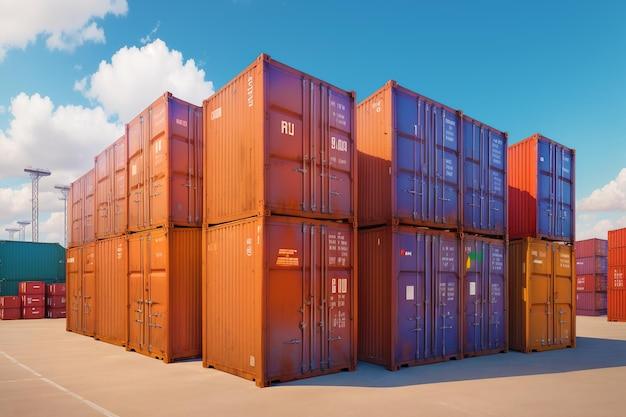Transportation is an integral aspect of the supply chain, and companies are always striving to optimize their logistical operations. In today’s globalized economy, businesses face intense competition, and achieving operational efficiency is essential to stay ahead of the curve. Freight benchmarking is a powerful tool that aids organizations in measuring their success against industry norms.
Freight benchmarking involves gathering data on a company’s freight activity and comparing it against that of its competitors in the same market. By comparing performance metrics, businesses can identify areas for improvement and implement strategic changes that help them operate more efficiently. Real-time freight data is the backbone of successful benchmarking, and freightwaves analytics are instrumental in leveraging data to predict future trends and movements in the market.
This blog post will provide a comprehensive understanding of freight benchmarking, including what it is, how it works, and why it’s essential for companies today. In addition, we will explore the top freight benchmarking companies and their respective methods for data collection and analysis. Through this blog post, readers will gain insight into the significance of benchmarking in logistics and how it can revolutionize their supply chain operations.
So buckle up and get ready to learn all about the latest advancements in freight benchmarking and how they are transforming the logistics industry. By the end of this post, you’ll understand why benchmarking is a critical component of the modern supply chain and how it can help your organization reach new heights of success.
Freight Benchmarking: A Comprehensive Guide
When it comes to optimizing your freight operations, one of the most crucial steps you can take is freight benchmarking. This process involves comparing your freight costs and performance metrics to those of your competitors or industry standards. It helps you identify areas where you can improve efficiency, reduce costs, and enhance your overall logistics operations.
What is Freight Benchmarking
Freight benchmarking is the process of measuring your freight performance against industry standards or your competitors. Benchmarking can be done for various aspects of your freight operations, including transportation costs, transit time, shipment visibility, and customer service. It helps you understand where you stand in the industry, identify gaps in your performance, and set goals for improvement.
Why is Freight Benchmarking Essential
Freight benchmarking provides numerous benefits to your company. It enables you to:
-
Identify opportunities for cost savings: By comparing your transportation costs to industry averages, you can identify areas where you are overspending and implement cost-saving measures.
-
Enhance service quality: Looking at your service metrics against your competitors’ can help you identify areas where you can improve service quality and customer satisfaction.
-
Optimize processes: Benchmarking can help you identify areas where you can improve your freight processes to reduce transit times, improve visibility, and streamline operations.
How to Conduct Freight Benchmarking
To conduct freight benchmarking, you need to follow these steps:
-
Determine what you want to benchmark: Decide which areas of your freight operations you want to compare and identify relevant metrics.
-
Identify benchmarks: Find industry data and standards, industry reports, and competitor data to compare and see how you stack up against them.
-
Analyze the data: Analyze the data against your performance and identify gaps and opportunities for improvement.
-
Set improvement goals: Set specific, measurable goals for improving your freight performance based on the benchmarking results.
-
Implement changes: Implement changes to your freight operations based on the improvement plan and monitor the results.
Freight benchmarking is a crucial process that can help logistics managers optimize their freight operations. By comparing your performance and costs to industry standards and competitors, you can identify areas where you can improve your efficiency, reduce costs, and enhance your overall service quality. By following the steps outlined in this guide, you can conduct effective freight benchmarking and achieve significant improvements in your logistics operations.
Freight Data: Unlocking the Power of Information
If freight benchmarking is the key to optimizing your supply chain, freight data is the vehicle that gets you there. By analyzing and interpreting vast amounts of data, you can gain insight into your operations that you never thought possible. In this subsection, we’ll be exploring the world of freight data, how it can be used to increase efficiency and reduce costs, and the tools you need to harness its true potential.
What is Freight Data
In simple terms, freight data refers to any information that relates to the movement of goods from one location to another. This can include everything from shipping rates to carrier performance metrics, and much more. By collecting and analyzing this data, you can gain valuable insights into your supply chain operations, identifying areas for improvement and optimizing your processes.
Why is Freight Data Important
Effective use of freight data can significantly reduce your shipping costs while improving overall efficiency and reducing downtime. By analyzing trends over time, you can identify areas where you could be saving money on transportation and logistics costs while improving delivery times.
Types of Freight Data
There are several types of freight data that can be useful in supply chain optimization. These include:
- Carrier performance metrics: by tracking on-time delivery rates and other key performance indicators, you can identify the most effective shipping carriers for your business.
- Freight rates: by analyzing different freight rates across different carriers, you can identify the carriers with the best rates for your shipping needs.
- Transit times: by analyzing transit times for various shipping routes, you can identify the quickest and most efficient delivery options.
- Shipping volume and frequency: by tracking shipping volume and frequency, you can optimize your supply chain operations, reducing costs and improving efficiency.
How to Utilize Freight Data
To get the most out of your freight data, you need the right tools and expertise. Freight benchmarking software can help you collect, analyze, and interpret vast amounts of data, identifying trends and opportunities for optimization. By partnering with a third-party logistics provider, you can also access expert guidance and support in leveraging your freight data to increase efficiency and minimize costs.
Freight data is a powerful tool in optimizing your supply chain operations. By collecting and analyzing vast amounts of information, you can gain valuable insights into your shipping processes, identify areas for improvement, and optimize your operations to reduce costs and increase efficiency. With the right tools and expertise, you can unlock the true potential of freight data and take your business to the next level.
FreightWaves Analytics
If you’re looking to stay on top of the constantly changing freight industry trends, FreightWaves Analytics is the go-to resource for big data analytics. Using cutting-edge technology, FreightWaves Analytics offers unparalleled insights into the world of freight transportation.
Data-Driven Insights
FreightWaves Analytics provides real-time updates on key metrics, including rates, capacity, and market trends. With their comprehensive dashboard, you can view data on carrier performance, route analysis, and much more, giving you a complete view of the freight market.
Predictive Analytics
FreightWaves Analytics uses machine learning and predictive analytics to provide users with the most accurate market forecasts. With their proprietary SONAR platform, you can get real-time insights into freight market trends and plan your logistics accordingly.
Industry-Leading Experts
FreightWaves Analytics employs a team of experts with years of experience in the freight industry. From economists to data scientists, the team at FreightWaves Analytics provides unmatched insights into the world of transportation.
By leveraging big data and cutting-edge technology, FreightWaves Analytics is revolutionizing the way we view the freight industry. With their data-driven insights and predictive analytics, you can make informed decisions and stay ahead of the competition. Whether you’re a shipper, carrier, or logistics provider, FreightWaves Analytics is the ultimate resource for staying on top of the ever-changing freight market.
Freight Market Forecast
The freight industry is a dynamic sector that is often affected by changes in the economy, trade agreements, global pandemics, and natural disasters. As such, it is important to keep up with the latest trends and forecasts in the industry to ensure that businesses can adapt accordingly.
Current State of the Freight Market
According to industry experts, the freight market has been on a rollercoaster ride in recent years. In 2018, the market was booming with high demand, tight capacity, and rising rates. However, this trend was short-lived as 2019 saw a slowdown in demand, an increase in capacity, and falling rates. The COVID-19 pandemic further disrupted the market in 2020 with shutdowns, reduced demand, and supply chain disruptions.
Future Predictions for the Freight Market
Despite the challenges faced by the industry, there is optimism that the freight market will recover in the coming years. Experts predict that the market will return to growth in 2021 as the global economy rebounds from the pandemic. The International Air Transport Association (IATA) forecasts a 13.1% growth in air cargo demand in 2021 compared to 2020.
The transportation industry is also expected to benefit from the continued growth of e-commerce. The rise of online shopping has increased the demand for fast and efficient delivery services, propelling the growth of last-mile delivery services.
Impact of Technology on the Freight Market
The freight industry has always been at the forefront of technological innovation. New technologies such as automation, artificial intelligence, and big data analytics are transforming the sector by improving efficiency, reducing costs, and enhancing customer experience.
In the coming years, the industry is expected to see significant changes in the way freight is transported and delivered. For instance, the use of drones, autonomous vehicles, and robots in last-mile delivery is predicted to increase, making the delivery process faster, cheaper, and more reliable.
In conclusion, the freight industry is a complex and ever-evolving sector that requires businesses to keep up with the latest trends and forecasts. Understanding the current state of the freight market, future predictions, and the impact of technology is essential for businesses to remain competitive and successful.
What is Freight Benchmarking
Freight benchmarking is a method of measuring a company’s transportation performance and comparing it with other industry players. It involves gathering data on various aspects of freight operations such as cost per mile, transit time, and delivery performance, and then comparing it with industry standards.
Why do Companies Benchmark their Freight Operations
Benchmarking freight operations helps companies identify areas where they can improve their performance and reduce costs. By comparing their performance with the industry’s best practices, companies can set realistic goals to optimize their operations. It also allows them to identify opportunities for increasing efficiency, reducing waste, and enhancing overall supply chain management.
Methods of Freight Benchmarking
There are different methods of freight benchmarking, but the most common include:
-
Data Collection – This involves gathering data on freight operations such as freight rates, transit time, and delivery performance, and then comparing the results with those of other companies in the industry.
-
Partner Benchmarking – Companies can benchmark their performance against their partners’ performance. This can help identify weak links in the supply chain and optimize operations to enhance overall performance.
-
Industry Benchmarking – This involves comparing a company’s performance with industry standards and best practices. It helps identify areas where the company lags behind the industry average and opportunities for improvement.
Benefits of Freight Benchmarking
Freight benchmarking offers several benefits to companies, including:
-
Cost Reduction – Companies can identify areas of high cost and work to reduce the costs by optimizing operations.
-
Improved Efficiency – Benchmarking helps companies identify inefficiencies in the supply chain and optimize operations to improve efficiency.
-
Improved Risk Management – By benchmarking against industry standards, companies can better manage risks and uncertainties in the supply chain.
In conclusion, freight benchmarking is an important tool for companies in the shipping industry. Whether it’s data collection or partner benchmarking, companies should use benchmarking methods to compare their performance with the industry standard and enhance their overall performance.
Freight Benchmarking Companies
For companies operating in the freight industry, it can be challenging to determine which areas need improvement to optimize their logistics and gain a competitive edge. This is where freight benchmarking companies come in – they help businesses identify areas of improvement by comparing their operations against industry standards and best practices.
What are Freight Benchmarking Companies
Freight benchmarking companies are specialized firms that provide valuable insights into a company’s logistics performance by comparing their key performance indicators (KPIs) to those of their competitors. These companies use sophisticated software and data analysis tools to evaluate different aspects of the supply chain, including transportation costs, transit times, delivery reliability, and inventory management.
How do Freight Benchmarking Companies Work
To begin the benchmarking process, freight benchmarking companies first analyze a company’s data and KPIs, such as transportation costs per mile, transit time, and on-time delivery performance. They then compare these metrics against industry standards and best practices to identify areas where the company is overperforming or underperforming.
Once the areas of improvement are identified, the benchmarking company can provide recommendations for optimizing the supply chain, such as switching carrier providers, outsourcing specific processes, or adopting new technologies. These recommendations can help companies reduce their costs, improve their customer service level, and gain a competitive advantage over their peers.
Benefits of Freight Benchmarking Companies
Partnering with a freight benchmarking company can provide numerous benefits for companies in the freight industry, including:
- Increased efficiency: Freight benchmarking companies help companies identify inefficiencies in their supply chain and provide actionable recommendations for optimization.
- Cost savings: By optimizing the supply chain and reducing transportation costs, companies can improve their bottom line and increase profitability.
- Competitive advantage: Companies that work with freight benchmarking companies can gain a competitive edge by adopting best practices and staying ahead of the competition.
In conclusion, freight benchmarking companies provide valuable insights and recommendations that can help companies optimize their logistics and gain a competitive edge. By partnering with a freight benchmarking company, companies can reduce costs, increase efficiency, and ultimately succeed in the fast-paced and competitive freight industry.
What Is Freight Benchmarking
Freight benchmarking is the process of comparing your company’s freight costs and performance against the industry standards and best practices. It refers to measuring, analyzing, and evaluating your logistics operations to identify performance gaps and opportunities for improvement.
What Is Benchmarking in Logistics
Benchmarking in logistics involves evaluating your company’s freight performance against the performance of other companies in the same industry. This process helps you identify areas where your business is lagging behind or excelling, allowing you to adjust your operations to be more competitive and provide better service to customers.
Benchmarking involves collecting data on key performance metrics, such as transit time, delivery accuracy, and freight costs. This information allows you to identify trends and outliers, providing insights into which areas of your logistics operations need improvement.
Why Is Benchmarking Important in Logistics
Benchmarking is an essential component of any logistics management strategy. It offers a continuous improvement process that allows you to compare your operations to the industry standards, identify areas for optimization, and develop an action plan to enhance these areas.
By benchmarking your logistics operations, you gain insights into the best practices, industry trends, and customer expectations, which will enable you to streamline your operations to be more efficient, reduce costs, improve customer satisfaction, and gain a competitive edge over your rivals.
Benchmarking in logistics also helps you to identify potential risks and challenges that may affect your business operations, such as changes in regulations, freight rate hikes, or supply chain disruptions.
Therefore, if you want to remain competitive and thrive in the logistics industry, benchmarking your freight operations is a crucial first step towards achieving your goals.



